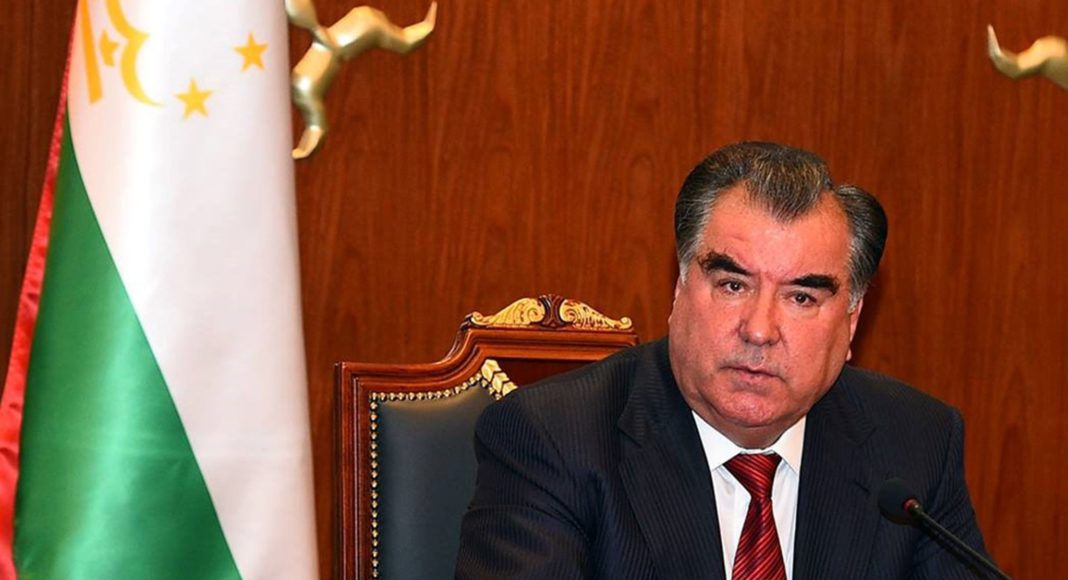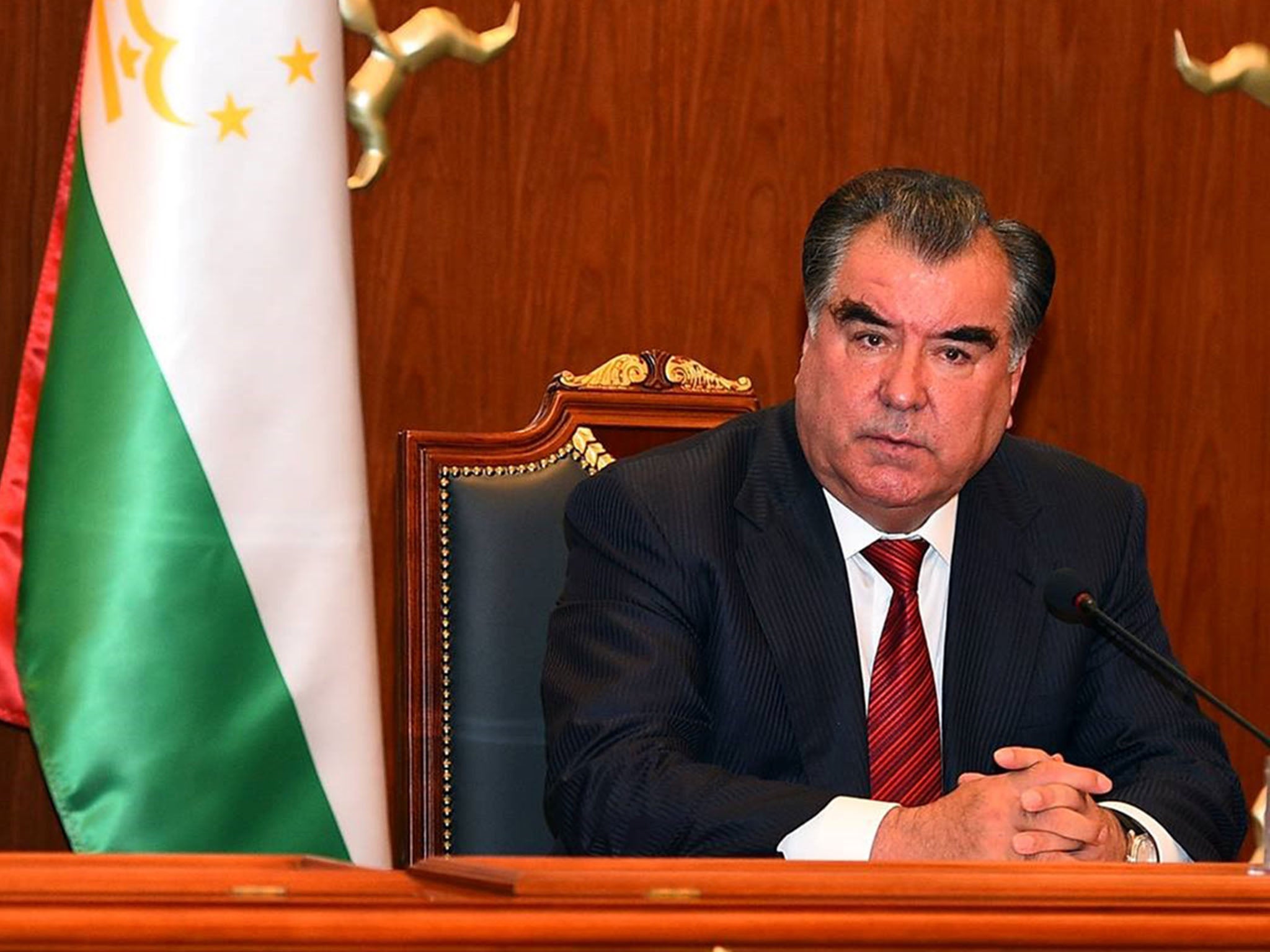The people of Tajikistan have voted overwhelmingly to allow their authoritarian president to rule indefinitely.
94.5 per cent of the 4 million people who cast their votes in the referendum on Sunday supported amendments to the national constitution, including a provision to remove presidential term limits.
The former Soviet state has been ruled by president Emomali Rahmon, 63, since November 1992.
Download the new Independent Premium app
Sharing the full story, not just the headlines
Download now
Tajiks vote in referendum seen as cementing president’s power
Read more
The term limit amendment only applies to Rahmon, owing to the ‘Leader of the Nation’ status parliament accorded to him late last year.
The minimum age for Tajik presidential candidates is also being lowered to 30, paving the way for Rahmon’s 29-year-old son to stand in the 2020 election.
Referendum ballots only permitted a general ‘yes’ or ‘no’ option, removing the chance to vote for each constitutional amendment indiually.
Tajikistan remains the poorest of the former USSR nations and ‘faith-based’ parties have been outlawed, despite the population being predominantly Sunni Muslim.
Voter Nazir Saidzoda told AFP: “Rahmon brought us peace, he ended the war, and he should rule the country for as long as he has the strength to.”
left
Created with Sketch.
right
Created with Sketch.
1/10 China
Escalating crackdown against human rights activists including mass arrests of lawyers and a series of sweeping laws in the name of ‘national security’.
2/10 Egypt
The arrest of thousands, including peaceful critics, in a ruthless crackdown in the name of national security, the prolonged detention of hundreds without charge or trial and the sentencing of hundreds of others to death.
3/10 Gambia
Torture, enforced disappearances and the criminalisation of LGBTI people; and utter refusal to co-operate with the UN and regional human rights mechanisms on issues including freedom of expression, enforced disappearance and the death penalty.
4/10 Hungary
Sealing off its borders to thousands of refugees in dire need; and obstructing collective regional attempts to help them.
5/10 Israel
Maintaining its military blockade of Gaza and therefore collective punishment of the 1.8 million inhabitants there, as well as failing, like Palestine, to comply with a UN call to conduct credible investigations into war crimes committed during the 2014 Gaza conflict.
6/10 Kenya
Extrajudicial executions, enforced disappearances and discrimination against refugees in its counter-terrorism operations; and attempts to undermine the International Criminal Court and its ability to pursue justice.
7/10 Pakistan
The severe human rights failings of its response to the horrific Peshawar school massacre including its relentless use of the death penalty; and its policy on international NGOs giving authorities the power to monitor them and close them down if they are considered to be “against the interests” of the country.
8/10 Russia
Repressive use of vague national security and anti-extremism legislation and its concerted attempts to silence civil society in the country; its shameful refusal to acknowledge civilian killings in Syria and its callous moves to block Security Council action on Syria.
9/10 Saudi Arabia
Brutally cracking down on those who dared to advocate reform or criticise the authorities; and committing war crimes in the bombing campaign it has led in Yemen (pictured) while obstructing the establishment of a UN-led inquiry into violations by all sides in the conflict.
10/10 Syria
Killing thousands of civilians in direct and indiscriminate attacks with barrel bombs and other weaponry and through acts of torture in detention; and enforcing lengthy sieges of civilian areas, blocking international aid from reaching starving civilians.
1/10 China
Escalating crackdown against human rights activists including mass arrests of lawyers and a series of sweeping laws in the name of ‘national security’.
2/10 Egypt
The arrest of thousands, including peaceful critics, in a ruthless crackdown in the name of national security, the prolonged detention of hundreds without charge or trial and the sentencing of hundreds of others to death.
3/10 Gambia
Torture, enforced disappearances and the criminalisation of LGBTI people; and utter refusal to co-operate with the UN and regional human rights mechanisms on issues including freedom of expression, enforced disappearance and the death penalty.
4/10 Hungary
Sealing off its borders to thousands of refugees in dire need; and obstructing collective regional attempts to help them.
5/10 Israel
Maintaining its military blockade of Gaza and therefore collective punishment of the 1.8 million inhabitants there, as well as failing, like Palestine, to comply with a UN call to conduct credible investigations into war crimes committed during the 2014 Gaza conflict.
6/10 Kenya
Extrajudicial executions, enforced disappearances and discrimination against refugees in its counter-terrorism operations; and attempts to undermine the International Criminal Court and its ability to pursue justice.
7/10 Pakistan
The severe human rights failings of its response to the horrific Peshawar school massacre including its relentless use of the death penalty; and its policy on international NGOs giving authorities the power to monitor them and close them down if they are considered to be “against the interests” of the country.
8/10 Russia
Repressive use of vague national security and anti-extremism legislation and its concerted attempts to silence civil society in the country; its shameful refusal to acknowledge civilian killings in Syria and its callous moves to block Security Council action on Syria.
9/10 Saudi Arabia
Brutally cracking down on those who dared to advocate reform or criticise the authorities; and committing war crimes in the bombing campaign it has led in Yemen (pictured) while obstructing the establishment of a UN-led inquiry into violations by all sides in the conflict.
10/10 Syria
Killing thousands of civilians in direct and indiscriminate attacks with barrel bombs and other weaponry and through acts of torture in detention; and enforcing lengthy sieges of civilian areas, blocking international aid from reaching starving civilians.
The government has been criticised by human rights campaigners in recent years for forcing young men to remove their beards and women to cast off their headscarves.
The autocrat Rahmon has been accused of disregarding religious freedoms, civil norms and political pluralism during his 24-year tenure.
In November 2012 the country banned Facebook to prevent ‘mud and slander’ being said by critics against Rahmon’s regime.
No hype, just the advice and analysis you need
The president came to power amid a brutal civil war which claimed 20,000 Tajik lives.
Previous constitutional referendums held in 1999 and 2003 also focussed on extending Rahmon’s stay in power.




